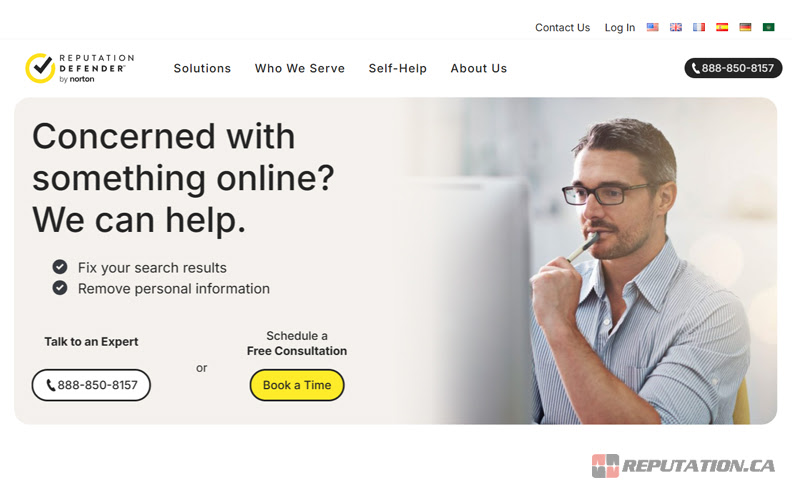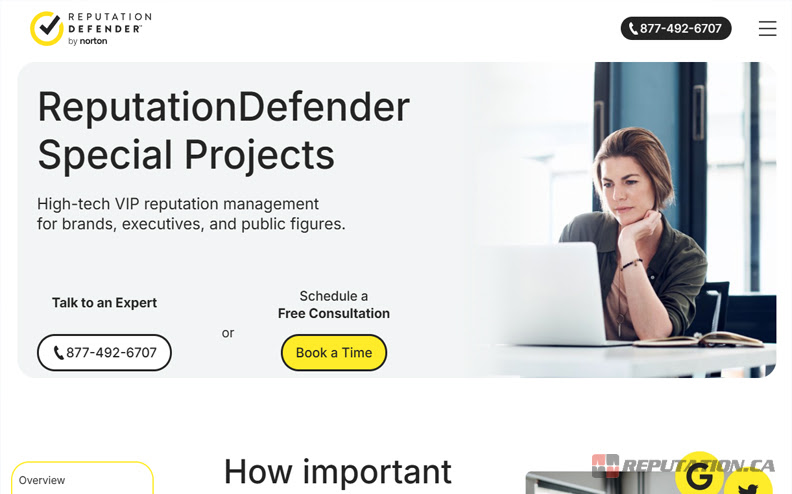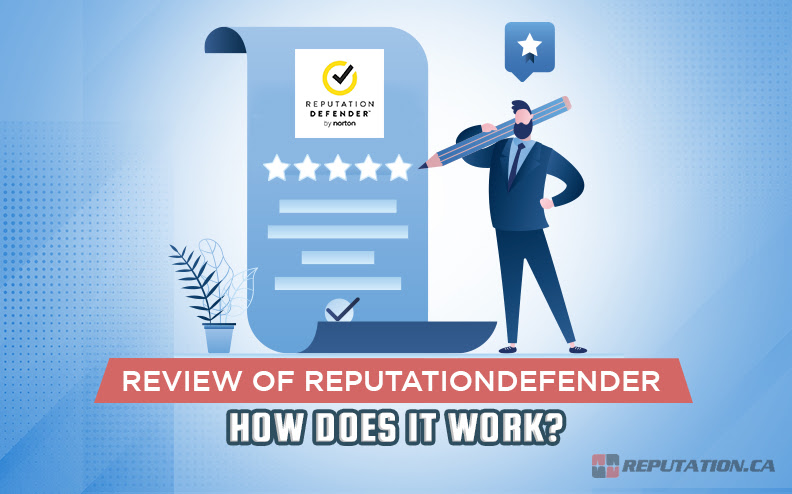A single bad search result can knock a professional out of the running for their next job, or it can drain thousands of dollars from a business’s bottom line. Google actually shows wrong information about 36% of people and businesses, and nearly a third of workers hate what they see when they search their own name. These problems don’t go away on their own either – they just stay there for years, and they spread to other sites way faster than anyone can manage by themselves.
ReputationDefender was started back in 2006 to help fix this problem in online identity management. The company mostly works with executives and small business owners who know that their online footprint has a big effect on their career and their personal life. I’ll talk about how their technology actually works and if their services are worth the high price tag.
Let’s talk about ReputationDefender’s exact strategy for tracking and changing what shows up in search results.
What ReputationDefender Does
ReputationDefender is one of the services that saves your career when problems come up online. Michael Fertik founded the company in 2006 after he saw a problem: regular people had no way to manage what showed up about them on Google. Before his company came along, reputation management was only available to big corporations and celebrities who could afford expensive PR firms.
The way the company operates is actually pretty simple-it all revolves around 3 main strategies. The first strategy is monitoring everything about you across the entire internet. We’re talking about tracking your name on websites, social media accounts, news articles, and anywhere else it might pop up in search results. Anytime something new shows up with your name on it, their system alerts you right away. The second part of their service is where the process gets interesting. Once they find negative content about you, they have a few different ways to handle it. Sometimes they can get harmful or false information removed completely from the internet. In other situations, their team works to push that content so far down in search results that hardly anyone will ever find it. The exact strategy depends on the type of content involved and where it’s posted.

The third big component of what they do is to build up positive content about you online. ReputationDefender’s team creates and promotes articles, professional websites, and social media profiles that show off your achievements and expertise. The idea is simple – when somebody searches for your name, all these positive results show up at the top of the page. The usual ReputationDefender client tends to be an executive, doctor, lawyer, or small business owner, which makes perfect sense. They can’t afford to have their reputation damaged online. A single bad review or negative news story can damage their ability to bring in new clients or land their next job.
Apart from the standard reputation problems, the company deals with very particular and tough situations, too. Divorce proceedings can sometimes expose personal information that was never meant to be public. Clients can get mistaken for somebody with the same name who has committed a crime in other cases, which is an absolute nightmare scenario for anyone’s career. Even those old party photos and questionable posts from college can come back to haunt you years later during background checks for new positions.
The Technology Behind ReputationDefender’s Platform
ReputationDefender has developed proprietary technology that scans the internet all the time for any mentions of your name or business. The system monitors all the big search engines like Google and Bing, and it also watches social media sites and review sites across the web. The software runs around the clock, so it can catch new content right when it shows up online.
After the system locates content about you, it needs to work out how visible that content actually is to the average person looking you up. A negative review that shows up on the very first page of Google is obviously going to be flagged as a high-priority problem. An old complaint that’s buried somewhere on page 10 of the search results probably won’t need immediate attention. The algorithm takes into account a few things, like search volume for your name and roughly how many visitors are going to stumble across each piece of content.

After they’ve identified the problems that need fixing, ReputationDefender starts the process of pushing negative content down in the search results, where not as many viewers will be able to see it. They do this by creating new websites and articles that show off the positive sides of your reputation. These aren’t fake reviews or fabricated stories, though – everything that they create is legitimate content that actually follows Google’s strict standards for expertise and trustworthiness. The company also develops backlinks from established websites and helps strengthen the authority of all that positive content they’re creating. When search engines see these quality backlinks, they usually rank the positive content higher, and the negative items start to drop lower in the search results. It’s search engine optimization except that the entire focus is specifically on controlling what shows up when somebody searches for your name or brand.
ReputationDefender has also established partnerships with different data removal services that can formally request takedowns of content from some websites. They also collaborate with legal teams in situations where content violates either laws or a website’s terms of service. If somebody posts your private information without permission or makes demonstrably false claims about you, these formal channels can sometimes get the content removed completely from the internet.
The entire process relies on completely legitimate methods that actually work with how search engines want their content ecosystem to function.
Service Tiers and Investment Requirements
ReputationDefender has 3 different service packages, and each one is made for a particular type of customer who needs help with what shows up about them online. Their Protect tier is the most basic option, and it’s mainly about keeping tabs on what shows up about you across the internet – and it usually costs somewhere in the neighborhood of $1,000 per month. Their Defend package is a bit more thorough because it actively works to fix the reputation problems that are already there, and customers usually pay between $3,000 to $7,000 monthly for this level of service. Then there’s their Content tier, and it focuses on creating and publishing positive material that eventually pushes those negative search results way down on the page – and for tough situations, this might cost over $15,000 per month.
A few things come into play when ReputationDefender calculates what they’re going to charge you. The severity of your reputation problems is probably the biggest thing here. Industry competition is another big consideration. A restaurant owner who manages their reputation in New York City has a very different situation than a consultant who works in a smaller regional market.

Almost everyone who works with ReputationDefender signs a contract that lasts between 6 and 12 months, and there’s a reason for that. Reputation repair is a slow process that takes patience. You can’t wave a magic wand and make the bad content disappear overnight. Search engines need a few weeks or sometimes even months to find and rank all that new positive content above the older negative material that’s been sitting there.
The monthly fees may look pretty high at first glance. But business owners who’ve been through this process usually find that the investment actually makes plenty of sense once they sit down and calculate the cost of reputation damage. Lost customers start to pile up fast, and missed opportunities can hurt your bottom line. Harvard Business School did some research on this, and they found that each extra star in online ratings can bump up their revenue by 5% to 9% for small businesses!
The reason these services need continuous financial commitment is all about how search engines and online content work these days.
Content Creation and Suppression Strategies
The strategy begins by creating a foundation of professional online assets for each client. That includes polished websites, optimized social media profiles, and well-placed press releases. Biography sites and professional directories become part of it as well. The goal is simple but effective – when anybody types your name into a search bar, these well-made pages should dominate the top positions as that embarrassing news story or angry review from years ago gets buried on page 4, where nobody will ever find it.
It operates more like a marathon than a sprint. ReputationDefender might optimize a LinkedIn profile to rank more prominently, or they’ll develop a personal website that shows off professional achievements and expertise. The directory listings get claimed and updated, and when it makes sense, Wikipedia entries receive attention too. All this content acts as another layer of protection between your name and any negative material lurking in the search results.

Patience matters quite a bit with this type of service. The first improvements usually become visible after 3 to 6 months. But anyone who wants to see dramatic changes should plan on at least a full year of steady effort. Search engines don’t update their rankings overnight – they need to have enough time to find, review, and then position this fresh content in their indexes.
Reputation management shifted quite a bit when the FTC introduced stricter laws in 2019 about deceptive practices in the industry. These laws forced businesses to abandon questionable tricks like fake reviews or manipulative link setups. ReputationDefender responded to these changes by doubling down on its commitment to authentic and worthwhile content creation that serves its clients’ interests. Professional sites like LinkedIn and well-optimized company websites produce strong results in search rankings. The news coverage from respected publications carries a particular weight with search algorithms and makes PR work an especially important component of any reputation management campaign.
The Boundaries and Challenges
ReputationDefender can help with all kinds of different online reputation problems, and its services cover lots of ground. Even the best reputation management company has limitations on what it can do. Court records and big news stories that come from media outlets are nearly untouchable. These sources have very strong legal protections in place, and they’re not going to remove accurate and factual information just because a client wants it gone.
The company faces another big limitation with websites where they don’t have existing relationships or agreements. Say a person decides to write about you on their personal blog or maybe on some forum that’s hosted in another country, ReputationDefender likely won’t have any way to handle that content. Every platform has its own rules, and the company has to work within those frameworks.
The reputation management industry went through a big change back in 2008 when ReputationDefender got hit with a lawsuit over some of its business practices. This lawsuit ended up completely changing how every company in the industry does its work. ReputationDefender had to completely restructure its methods, and now it only uses ethical strategies that won’t later come back to haunt its clients. One area that they refuse to touch is fake reviews or misleading content created as a way to push down negative information. The company learned this lesson through its experience, and it shaped its entire philosophy.

Lots of clients become frustrated once they find out that the negative content isn’t going to vanish overnight. A large portion of the online content receives protection under Section 230 of the Communications Decency Act. What this law means is that website owners aren’t held responsible for content that users post on their sites. Even if something that’s written about you feels unfair or cruel, the law might still protect its right to remain online.
Another reality that clients need to accept is that reputation management is never actually finished. Your search results could be completely clean now, and then tomorrow morning, somebody could publish something new about you. The process needs constant watching and adjustment, and it never reaches a final endpoint.
Monitor and Manage Your Reputation
Online reputation has evolved into this bizarre world where one unfortunate screenshot can haunt you for the next 20 years and where another person who happens to share your name can completely tank your career opportunities without even realizing it. I’ve spent a lot of time looking at how ReputationDefender and other reputation management firms work, and control over what shows up when somebody searches for you has become far more complex. The technology and strategies that these firms deploy are very advanced – even though the costs can be extremely high.
The part that amazes clients is how much patience the entire process takes – we’re usually looking at a few months or sometimes multiple years of consistent effort to see any changes in those search results. The key lesson from this research is that your online reputation isn’t a one-time fix that you can just set and forget. Fresh content shows up on the internet every day, and search engines always update their algorithms in ways that can completely change what ranks on page one. The tactics that worked great last year could be completely useless now.

Some people can manage basic reputation maintenance on their own with enough time and determination to dedicate to it. But when the situation includes major problems like defamatory content taking over the first page of Google or past mistakes that refuse to fade into obscurity, professional intervention usually becomes the only option. The best strategy is to have realistic expectations about what’s actually possible – no company can wave a magic wand and erase court records or major news coverage, no matter how much money you’re ready to spend.
Ready to take control of your online reputation? Trust Canada’s leading experts in review management, social media, public relations, and crisis response. From cancel culture to building a stronger presence online, we’re here to help. Contact Reputation.ca to take control of your reputation!







